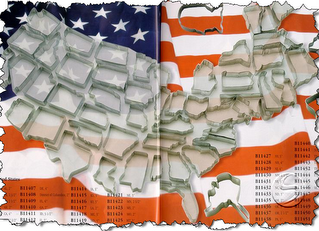States of the Union
 Janet Novack's article in Forbes this month "Watch the States" should raise a lot of eyebrows among State Legislators, State residents, and those who hold power in Washington.
Janet Novack's article in Forbes this month "Watch the States" should raise a lot of eyebrows among State Legislators, State residents, and those who hold power in Washington.
It seems the States are making up for the current vacuum of useful legislation on the federal level. That the States are taking the initiative is just fine by me. In fact, Governors and State Legislatures should go even further. Voters tend to pay less attention to their local, municipal and state government in deference big ticket issues that are covered nationally by our news media.
However, Americans should consider changing their thinking; all politics is local. It may be easier for large states like California to pave the way with legislation given its size and clout, but this does not mean smaller states should back down from setting precedent.
Take, for example, last year's Supreme Court case on Connecticut's right of eminent domain. Eliot Spitzer, New York State's Governor-elect, rode to office on a wave of disgust after the Enron scandal that he used to clean up Wall Street. California, of course has led the way regarding Greenhouse gas emissions and fuel efficiency. The dearth of federal leadership on these issues and others should be a wake-up call for voters.
The fact is that the federal government will not be able to tackle each issue near and dear to the heart of every state in the union, nor should it. Sometimes, Congress does just the opposite (see Terry Schiavo). Perhaps the most pervasive issues that have been wrongly placed in federal jurisdiction are abortion and gay marriage, among others. The national debate on these issues should not be tabled for their sheer divisiveness, or their lack of real or perceived benefit to the interests of the federal government. Rather, neither issue has any bearing to elected officials in Washington, nor do politicians elected to Congress or the Presidency have a legal right to pass laws in these areas.
The tenth Amendment to the United States Constitution reads as follows: "The powers not delegated to the United States by the Constitution, nor prohibited by it to the states, are reserved to the states respectively, or to the people." It's high time the federal government took another look at the Constitution and used its legislative power as it was intended, not as an antidote, part of a national party platform, political hot button issue, or shallow campaign promise.








No comments:
Post a Comment